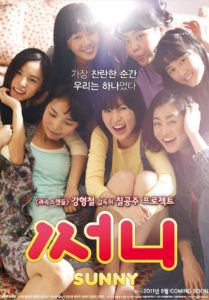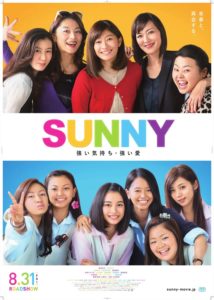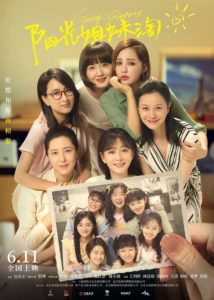Sunny Sisters
阳光姐妹淘
China, 2021, colour, 2.35:1, 116 mins.
Director: Bao Bei’er 包贝尔.
Associate director: Li Nan 李南.
Rating: 6/10.
Faithful remake of South Korean hit Sunny has strong chemistry and casting but still doesn’t match the joyous tone of the original.
Dacheng city, coastal southern China, 2020. Zhang Lijun (Yin Tao) is a well-off but lonely housewife with a businessman husband (Tan Kai) who pays her little attention and a moody teenage daughter (Li Zixuan) who hardly listens to her. Visiting her mother (Li Ping) in hospital, Zhang Lijun discovers by chance that a patient in a private room there is Lin Qing (Zeng Li), a classmate from senior high whom she hasn’t seen for 23 years. Now a wealthy businesswoman, Lin Qing has been diagnosed with cancer and has two months to live. She says she misses the old days, when they and five others formed a tight-knit group called Sunny Sisters 阳光姐妹. Zhang Lijun has to leave when her husband calls and says he’s about to go on a business trip, but she promises Lin Qing she’ll visit again. Later, Zhang Lijun drives to her old high school to revive her memories. (In 1997, aged about 15, with gauche ways and rabbit teeth, Zhang Lijun [Wang Yueting] had been a transfer student at the high school after her family had moved down south from Harbin. On her first day at school she’d been laughed at because of her northeastern accent and yokel ways, and had been bullied by one classmate, Cao Jiahui [Jiang Yixuan]. But she’d been adopted by her deskmate Zhu Zhu [Wang Qing], who was obsessed with food and double eyelids, and her friends: Qiu Yuhong [Xia Meng], who dreamed of becoming Miss Hong Kong; bookworm Yang Mei [Zhao Ming], who constantly read martial-arts novels; rough-mouthed Huang Xiaojuan [Yang Han}; and the girl-group’s tomboyish leader Lin Qing [Liang Songqing]. Also a member of the group, but moody and a loner, was Li Youran [Zhou Jieqiong], the school beauty, who for some reason had taken an instant dislike to Zhang Lijun. Zhang Lijun’s family were unsophisticated northeasterners, who’d moved south for her father [Yang Haoyu] to try his hand at business; her elder brother [Liu Xiaohai] was a slacker, obsessed with rock music, and her grandmother [Zhao Shuzhen] had a rough mouth.) With help from her Chinese teacher (Dai Lele) who’s still at the school, Zhang Lijun tracks down Zhu Zhu (Jiang Xiaohan), now an under-performing saleswoman for a biscuit company, and takes her along to meet Lin Qing. Zhu Zhu has the idea of using Xiong (Xu Juncong), a private investigator she knows, to track down the rest of the group. (At school, during a stand-off with rival girl-gang Spaceship Girls 飞船少女, Zhang Lijun had performed so well that she’d been officially made one of the group, which a radio host later dubbed Sunny Sisters.) Xiong manages to find Huang Xiaojuan (Zhang Xinyi), Yang Mei (Ma Su) and Qiu Yuhong (Ni Hongjie), all of whom are shadows of their former selves; but Li Youran proves more difficult to locate. Meanwhile, Zhang Lijun has privately asked Xiong to track down Song Feiyu (Chen Heyi), a handsome friend of Zhu Zhu’s elder brother (Ximen Piaopiao) whom she’d fallen for back in 1997.
REVIEW
 Sunny 써니 (2011), one of New Korean Cinema’s most joyous and entertaining movies, gets an okay Chinese remake with Sunny Sisters 阳光姐妹淘, the solo directing debut of baby-faced Mainland comic Bao Bei’er 包贝尔, 37, following his shared credit with Hong Kong’s Qin Xiaozhen 秦小珍 [Janet Chun] on action-comedy Fat Buddies 胖子行动队 (2018). Virtually a scene-for-scene (and sometimes shot-for-shot) remake, with whole chunks of dialogue preserved, it’s entertaining without being uplifting and good enough if you’ve never (or not recently) seen the original film. Box office was only a blah RMB95 million – maybe because of the shortage of star names, maybe because of the absence of Bao onscreen (unlikely), or maybe because the original film is just fine as it is.
Sunny 써니 (2011), one of New Korean Cinema’s most joyous and entertaining movies, gets an okay Chinese remake with Sunny Sisters 阳光姐妹淘, the solo directing debut of baby-faced Mainland comic Bao Bei’er 包贝尔, 37, following his shared credit with Hong Kong’s Qin Xiaozhen 秦小珍 [Janet Chun] on action-comedy Fat Buddies 胖子行动队 (2018). Virtually a scene-for-scene (and sometimes shot-for-shot) remake, with whole chunks of dialogue preserved, it’s entertaining without being uplifting and good enough if you’ve never (or not recently) seen the original film. Box office was only a blah RMB95 million – maybe because of the shortage of star names, maybe because of the absence of Bao onscreen (unlikely), or maybe because the original film is just fine as it is.
The Korean original, written and directed by Gang Hyeong-cheol 강형철 | 姜烔哲, who was riding high at the time on the huge success of his comedy Scandal Makers 과속스캔들  (2008) – faithfully remade in China by its producer, An Byeong-gi 안병기 | 安兵基, as Scandal Maker 外公芳龄38 (2016) – was a big hit locally and has already been remade (officially) three times: in Vietnam (Go Go Sisters Tháng năm rực rỡ, 2018), Japan (Sunny: Our Hearts Beat Together SUNNY 強い気持ち・強い愛, 2018, see poster, left) and Indonesia (Bebas, 2019). Like Sunny Sisters, none of the remakes uses the eponymous 1963 song by Bobby Hebb (in the 1976 cover by Boney M.) that gave the original film such an uplift, as well as its title. This means that Bao’s film, like the others, has to come up with spurious reasons for the word “sunny” as well as an equally memorable melody. For the women’s iconic final dance, Sunny Sisters uses the 1967 song Can’t Take My Eyes off You, by Bob Crewe and Bob Gaudio, which is okay but not quite the same, and doesn’t run through the film as a musical motif.
(2008) – faithfully remade in China by its producer, An Byeong-gi 안병기 | 安兵基, as Scandal Maker 外公芳龄38 (2016) – was a big hit locally and has already been remade (officially) three times: in Vietnam (Go Go Sisters Tháng năm rực rỡ, 2018), Japan (Sunny: Our Hearts Beat Together SUNNY 強い気持ち・強い愛, 2018, see poster, left) and Indonesia (Bebas, 2019). Like Sunny Sisters, none of the remakes uses the eponymous 1963 song by Bobby Hebb (in the 1976 cover by Boney M.) that gave the original film such an uplift, as well as its title. This means that Bao’s film, like the others, has to come up with spurious reasons for the word “sunny” as well as an equally memorable melody. For the women’s iconic final dance, Sunny Sisters uses the 1967 song Can’t Take My Eyes off You, by Bob Crewe and Bob Gaudio, which is okay but not quite the same, and doesn’t run through the film as a musical motif.
Writers Song Chengwei 宋成魏 and Zhang Peng 张鹏, along with “guest scriptwriter” 特邀编剧 A Mei 阿美 (who co-wrote Under the Hawthorn Tree 山楂树之恋, 2010, A Wedding Invitation 分手合约, 2013, and So Long, My Son 地久天长, 2019), closely follow Gang’s original script, even preserving the clever time transitions that the first film was famous for. Culturally, the tale of female friendship from senior high to adulthood has been painlessly relocated from Seoul to a fictitious Chinese coastal city somewhere in the south (the film was actually shot in Fujian province). The writers have sensibly got rid of most of the bullying culture that doesn’t exist in the same way in China, toned down the references to US pop culture, cleaned up a lot of the original’s swearing, sanitised the background of one character who’d fallen into prostitution, melded together some scenes, and made trims along the way, such as to the characters of the private investigator and the gutter-mouthed grandma. Shot in summer 2020, it comes in eight minutes shorter than the Korean original but feels just about the right length.
Where the original flashed back and forth across 30 years (from 2011 to 1980), Bao’s remake moves between 2020 and 1997, only 23 years, putting the adult women in their late 30s rather than mid-40s. Apart from being a nod to a significant date in Hong Kong history, the choice of 1997 seems meaningless in the story’s context, especially as it isn’t set in the former British colony. Other small alterations are dictated by the change in time and locale: the young heroine’s elder brother, an anti-government protestor in the Korean original, is here a slacker-cum-rocker who’s into pirate cassettes, and the girl herself, who’s mocked by her schoolmates for her yokel ways, comes from Harbin, in northeast China (actually Bao’s own hometown), a good enough substitution for South Korea’s Jeolla-do.
The oh-so-crucial chemistry between the two sets of leads is, thankfully, strong. Looking the exemplar of a frustrated housewife with a busy husband and moody teen daughter, TV’s Yin Tao 殷桃 (the docile wife in Mr. No Problem 不成问题的问题, 2016) anchors the whole film as the woman who, to repair her self-esteem, decides to hunt down her high-school gang when she finds one of them is now dying. She’s neatly paralleled in the 1997 story by the excellent Wang Yueting 王玥婷, 23, in her first film role as the 15-year-old version, who’s all rabbit teeth and new-girl gaucherie but earns the respect of her schoolmates. It’s invidious to single out individual actresses in such good ensembles, though the versatile Ni Hongjie 倪虹洁 (Silent Witness 全民目击, 2013; Blue Sky Bones 蓝色骨头, 2013), now 43, is good as the friend whose life has been wrecked. Many of the cast look quite similar to those in the Korean original, but none more so than comedian Qiao Shan 乔杉 as the lawyer in the final sequence, an inspired piece of casting. An extra touch at the very end leaves the remake seeming fresher than it actually is.
Technical credits are top-drawer, with several key Hong Kongers who worked on Fat Buddies, from the summery widescreen images of d.p. Chen Zhiying 陈志英, through the trim editing by editor Chen Zhiwei 陈志伟 [Andy Chan], to the across-the-years styling of Zhang Shijie 张世杰 [Stanley Cheung] and costuming by Luo Peisha 罗珮莎. A re-imagining of the “meeting” between the two versions of the lead character – at a bus stop in the original film, outside a cinema in the remake – makes clever use of VFX without overdoing it. The film’s Chinese title is the same one used in China for the Korean original, and roughly means “The Mischievous Sunny Sisters”. Associate director, Wuhan-born Li Nan 李南, 35, is a longtime assistant director and executive director who worked with Bao on the online TVD Happy Hunter 欢喜猎人 (2020), starring Bao, his actress wife Bao Wenjing 包文婧 and comedienne Jia Ling 贾玲 (Hi, Mom 你好,李焕英, 2021).
CREDITS
Presented by Shanghai Firework Entertainment (CN), Beijing Enlight Media (CN). Produced by Shanghai Firework Entertainment (CN).
Script: Song Chengwei, Zhang Peng. Guest scriptwriter: A Mei. Photography: Chen Zhiying. Editing: Chen Zhiwei [Andy Chan]. Music supervision: Varqa Buehrer. Art direction: Chen Weiren. Styling: Zhang Shijie [Stanley Cheung], Luo Peisha. Costumes: Zhang Caiyan. Sound: Liu Lijie. Action: Zheng Hong, Li Xinquan. Visual effects: Wang Xiaowei (Beijing Changkong Image). Choreography: Ayida Muhamaiti.
Cast: Yin Tao (Zhang Lijun), Zeng Li (Lin Qing), Zhang Xinyi (Huang Xiaojuan), Ma Su (Yang Mei), Ni Hongjie (Qiu Yuhong), Jiang Xiaohan (Zhu Zhu), Wang Yueting (young Zhang Lijun), Zhou Jieqiong (young Li Youran), Liang Songqing (young Lin Qing), Wang Qing (young Zhu Zhu), Yang Han (young Huang Xiaojuan), Xia Meng (young Qiu Yuhong), Zhao Ming (young Yang Mei), Qiao Shan (Lin Qing’s lawyer), Pan Binlong (Pan, Zhu Zhu’s manager), Yuan Hong (adult Song Feiyu), Jie Bing (Huang Xiaojuan’s husband), Xu Juncong (Xiong, private investigator), Liu Xiaohai (Zhang Haojun, Zhang Lijun’s elder brother), Tan Kai (Cui Wei, Zhang Lijun’s husband), Dai Lele (Yu, Chinese teacher), Li Ping (Zhang Lijun’s mother), Yang Haoyu (Zhang Lijun’s father), Zhao Shuzhen (Zhang Lijun’s grandmother), Ximen Piaopiao (Zhu Zhu’s elder brother), Li Zixuan (Leilei, Zhang Lijun’s daughter), Chen Heyi (young Song Feiyu), Jiang Yixuan (Cao Jiahui), Zhang Menglu (Spaceship Sisters gang head), Xiao Han (Li Youran’s step-mother), Jiang Feng (head teacher), Feng Shuo (physics teacher), Jiang Yifan (Yang Mei’s husband).
Release: China, 11 Jun 2021.
